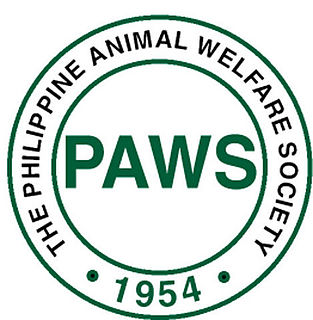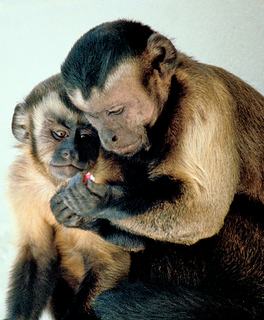
A pet, or companion animal, is an animal kept primarily for a person's company or entertainment rather than as a working animal, livestock or a laboratory animal. Popular pets are often considered to have attractive appearances, intelligence and relatable personalities, but some pets may be taken in on an altruistic basis and accepted by the owner regardless of these characteristics.
The term "big cat" is typically used to refer to any of the five living members of the genus Panthera, namely the tiger, lion, jaguar, leopard, and snow leopard, as well as the non-pantherine cheetah and cougar, and sometimes the clouded leopard. However, only the first 4 of these species are able to roar.

The Norwegian Forest cat is a breed of domestic cat originating in Northern Europe. This natural breed is adapted to a very cold climate, with a top coat of glossy, long, water-shedding hair and a woolly undercoat for insulation. Although this is uncertain, the breed's ancestors may have been a landrace of short-haired cats brought to Norway by the Vikings around 1000 AD, who may also have brought with them long-haired cats, like those ancestral to the modern Siberian and Turkish Angora. During World War II, the breed became nearly extinct until efforts by the Norwegian Forest Cat Club helped the breed by creating an official breeding program. It was registered as a breed with the European Fédération Internationale Féline in the 1970s, when a local cat fancier, Carl-Fredrik Nordane, took notice of the breed and made efforts to register it. Currently, the Norwegian Forest breed is very popular in Norway, Denmark, Sweden, Iceland and France.

Pet adoption is the process of taking responsibility for a pet that a previous owner has abandoned or released to a shelter or rescue organization. Common sources for adoptable pets are animal shelters and rescue groups. Some organizations give adopters ownership of the pet, while others use a guardianship model wherein the organization retains some control over the animal's future use or care.

A wolfdog is a canine produced by the mating of a domestic dog with a gray wolf, eastern wolf, red wolf, or Ethiopian wolf to produce a hybrid.

Although capable of living indoors with humans similarly to cats or dogs, pet skunks are relatively rare, partly due to restrictive laws and the complexity of their care. Pet skunks are mainly kept in the United States, Canada, Germany, the Netherlands, Poland, and Italy.

The Animal Welfare Act was signed into law by President Lyndon B. Johnson on August 24, 1966. It is the main federal law in the United States that regulates the treatment of animals in research and exhibition. Other laws, policies, and guidelines may include additional species coverage or specifications for animal care and use, but all refer to the Animal Welfare Act as the minimally acceptable standard for animal treatment and care. The USDA and APHIS oversee the AWA and the House and Senate Agriculture Committees have primary legislative jurisdiction over the Act. Animals covered under this Act include any live or dead cat, dog, hamster, rabbit, nonhuman primate, guinea pig, and any other warm-blooded animal determined by the Secretary of Agriculture for research, pet use or exhibition. Excluded from the Act are birds, rats of the genus Rattus, mice of the genus Mus, farm animals, and all cold-blooded animals.
An animal rescue group or animal rescue organization is dedicated to pet adoption. These groups take unwanted, abandoned, abused, or stray pets and attempt to find suitable homes for them. Many rescue groups are created by and run by volunteers, who take animals into their homes and care for them — including training, playing, handling medical issues, and solving behavior problems — until a suitable permanent home can be found.
Overpopulation in domestic pets is the surplus of pets, such as cats, dogs, and exotic animals. In the United States, six to eight million animals are brought to shelters each year, of which an estimated three to four million are subsequently euthanized, including 2.7 million considered healthy and adoptable. Euthanasia numbers have declined since the 1970s, when U.S. shelters euthanized an estimated 12 to 20 million animals. Most humane societies, animal shelters and rescue groups urge animal caregivers to have their animals spayed or neutered to prevent the births of unwanted and accidental litters that could contribute to this dynamic.

Wells National Estuarine Research Reserve, located in Wells, Maine, USA, is 2,250 acres (9.1 km2) of protected land headquartered at a restored saltwater farm called Laudholm. As a National Estuarine Research Reserve, the Wells Reserve works to expand knowledge of coasts and estuaries, engage people in environmental learning, and involve communities in conservation, all with a goal of protecting and restoring coastal ecosystems around the Gulf of Maine. Wells Reserve funding is largely through the National Oceanic and Atmospheric Administration and the nonprofit Laudholm Trust.
The dog or domestic dog is a domesticated descendant of the wolf, characterized by an upturning tail. The dog derived from an ancient, extinct wolf, and the modern grey wolf is the dog's nearest living relative. The dog was the first species to be domesticated, by hunter–gatherers over 15,000 years ago, before the development of agriculture. Their long association with humans has led dogs to be uniquely adapted to human behavior, leading to a large number of domestic individuals and the ability to thrive on a starch-rich diet that would be inadequate for other canids.
The Feline Conservation Foundation (FCF) is a 501(c)(3) non-profit organization based in the Ohio, United States with a mission to conserve wild felines through educational opportunities, responsible ownership and advocacy. The Feline Conservation Foundation seeks to bridge the gap between professional zoos and private institutions to strengthen the genetic diversity of felines within zoological settings. The organization supports its members by offering resources that are current and progressive, and that promote optimal welfare and safety. The membership includes a wide range of exotic cat enthusiasts such as professional breeders, educators, sanctuary and zoo owners, and individual hobbyists, although ownership of or regular work with a wild feline is not required for membership.

A zoo is a facility in which animals are housed within enclosures, cared for, displayed to the public, and in some cases bred for conservation purposes.

The Philippine Animal Welfare Society (PAWS) is a volunteer-based, non-government organization whose goal is to prevent animal cruelty through education, animal sheltering and advocacy, based in Quezon City, Philippines. PAWS believes that the creation of a more peaceful society starts with the widening of mankind's circle of compassion which includes animals, thereby envisions a nation that respects animals, practices responsible pet ownership and protects wildlife. The volunteer-based organization rehabilitates these animals in the hope of finding them new homes and a second chance at a good life. PAWS does not take in pets of other people, but only victims of cruelty or neglect where the animal offenders are charged with violation of the Animal Welfare Act in court.
Pet shipping is an industry that involves transporting animals, specifically pets, often by plane. This service is commonly used when the animal's owner is moving house. However, it can also be used when transporting animals for other reasons, such as performing in dog shows. The worldwide industry body for pet shipping is the International Pet and Animal Transportation Association. Pet microchips, vaccinations, rabies titre tests, import permits, and health certificates may be required to ship an animal. Certain breeds are banned from the process due to the increase in associated risk.

The Massachusetts Society for the Prevention of Cruelty to Animals-Angell Animal Medical Center (MSPCA-Angell) is a 501(c)(3) non-profit organization with its main headquarters on South Huntington Avenue in the Jamaica Plain neighborhood of Boston, Massachusetts. It was founded in 1868, and is the second-oldest humane society in the United States. "MSPCA-Angell" was adopted as the society's identity in 2003, and indicates the names of its two closely related predecessor organizations: Massachusetts Society for the Prevention of Cruelty to Animals and Angell Animal Medical Center. The organization provides direct care to thousands of homeless, injured, and abused animals each year, and provides animal adoption, a veterinary hospital, advocacy, and humane law enforcement.
The National Animal Interest Alliance (NAIA) is a non-profit organization in the United States dedicated to promoting animal welfare and animal husbandry practices, strengthening the human-animal bond, and safeguarding the rights of responsible animal owners and professionals through research, public education and public policy. The NAIA mission is "to promote the welfare of animals."

An exotic pet is a pet which is relatively rare or unusual to keep, or is generally thought of as a wild species rather than as a pet. The definition varies by culture, location, and over time—as animals become firmly enough established in the world of animal fancy, they may no longer be considered exotic.
The Abu Dhabi Falcon Hospital (ADFH) is the first public medical institution exclusively for falcons in the United Arab Emirates. Established by Environment Agency – Abu Dhabi and opened on 3 October 1999, Abu Dhabi Falcon Hospital has become the largest falcon hospital in the UAE and in the world with a patient influx of approximately 11,000 falcons per year. The ADFH describes their mission as a goal "To protect, conserve, research, and promote captive-bred and wild falcons health, wildlife, and falconry tradition. To lead efforts of Abu Dhabi government to improve and protect animal welfare and to increase awareness and responsibility of people for animal welfare as the leading center for animal healthcare and welfare in Abu Dhabi Emirate."

Hundreds of millions of cats are kept as pets around the world. Cats have either a mutualistic or commensal relationship with humans.











